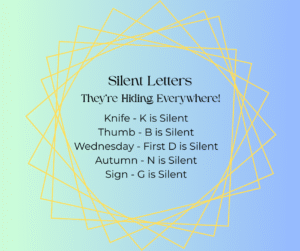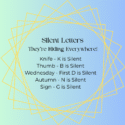As a poor speller, I’d like to say that silent letters are just rude. Not only do they make learning to spell miserable, they make learning to read miserable. (It’s thum, not thumb.)
Many years ago, I wrote a blog about properly pronouncing words. In that blog I reference the importance of pronouncing the letter R. In American English, there are no silent Rs. If you see one pronounce it, and if you hear one add it to your spelling.
Silent letters, however, are – as I said – rude. How the heck do I sound out a word if there are letters that don’t make noise? How do I know where to look in a dictionary if I don’t know if the word starts with F or Ph? (Just one of many reasons phonics didn’t work for me.)
When I studied French, I learned that almost any letter at the end of a word is silent. Frustrating? Yes. At least it’s the last letter and doesn’t hinder dictionary lookups.
What really got me on the silent letter thing was a stand-up routine I saw on social media: Michael McIntyre and Silent Letter Day.
In this routine, Mr. McIntyre questions why people would add letters to words that do not make any sound. And he starts with the letter H. An hour doesn’t need an H. (Visually, it helps separate the measure of time from the plural possessive, but homonyms are a rant for another day.)
 To expand the point, McIntyre suggests Silent Letter Day – a day to pronounce all the silent letters. It would occur on a Wednesday (wed-nes-day) in autumn (au-tum-n).
To expand the point, McIntyre suggests Silent Letter Day – a day to pronounce all the silent letters. It would occur on a Wednesday (wed-nes-day) in autumn (au-tum-n).
Because this is obviously funnier heard than read, I will leave you to watch the video. All the silents are at his mercy: h, b, t, g, ette, k, and so on. Plus, he’s British and uses words like knackered.
Around the time I saw Silent Letter Day, someone sent me The Alphabet is Wrong by Dave Gorman. I had never thought about how letters are spelled until seeing this and it sort of blew my brain. Makes me very glad that H (aitch) was never on a spelling test.
The difficulties I had learning to spell and read does make my preference for writing a bit ironic. That, though, has more to do with the words themselves and considerably less about how they’re spelled.
– Lorrie Nicoles
